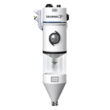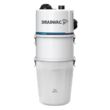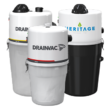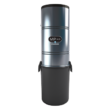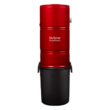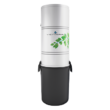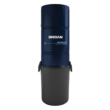You moved from a small apartment to a new house and choose to install a central vacuum system. By seeing the amount of space you now have, it makes you realize how powerful your vacuum will need to be. Yet, the total size of the cleaning surface has generally no influence on the required vacuum power.
A unit's power (in terms of air watts) determines how efficiently you can clean a surface area independently of the total surface perimeter to clean. Thus, a larger home only increases the number of times you need to replace the bag, but do not indicate if you need a more powerful system.
It is therefore the canister's capacity that should poke your interest when you have a large surface to clean, not the power. With a bigger tank, the bag will have to be replaced less often, offering you a better productivity. In that case, it would be more appropriate for you to look into our Cyclonik or Generation 2 series, which carries the biggest available canisters for the residential sector (up to 10 gal./46 L), compared to the S1000 series products (3.75 gal./17 L).
Exception
If the total length of the piping network is longer than 400 ft. (122 metres), you can expect a certain power loss. In this case, a unit of 800 AW or more can be necessary.
The surface area to clean is fundamental information to consider when buying a central vacuum system. However, in the vast majority of cases, it is not useful to determine the motor's power that you need. The surface area will be useful to determine the vacuum's tank capacity, the amount of wall outlets to install and the hose length.













